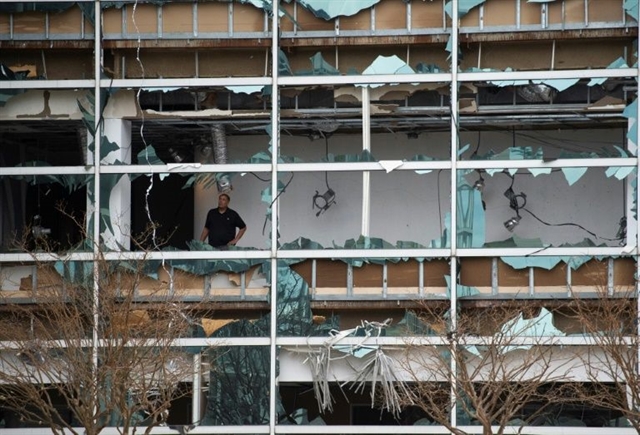 World
World


|
| The Capitol One Bank Tower in Lake Charles, Louisiana after Hurricane Laura hit. — AFP/VNA Photo |
LAKE CHARLES, United States — At least six people were killed by Hurricane Laura in Louisiana and search teams may find more victims, but the governor said Thursday that the most powerful storm to make landfall in the US state in living memory did not cause the "catastrophic" damage that had been feared.
"We have a lot to be thankful for," Louisiana Governor John Bel Edwards said at a press conference.
"It is clear that we did not sustain and suffer the absolute catastrophic damage that we thought was likely based on the forecast we had last night," Edwards said.
"But we have sustained a tremendous amount of damage," he said, and thousands of residents of the southern state have had their "lives turned upside down."
Hurricane Laura struck the coast of Louisiana early Thursday as a Category 4 storm – the second-highest on the wind scale. It has since been downgraded to a tropical storm.
Hurricane Katrina, which left 1,800 people dead in 2005, was a Category 3 storm when it made landfall. Only one storm has made landfall in Louisiana with wind speeds as high as Laura -- the Last Island hurricane of 1856, which left hundreds dead.
The Louisiana health department reported there had been six storm-related deaths. According to Edwards, four of them were "related to trees falling on residences."
Of the other two deaths, health authorities said, one man died of carbon monoxide poisoning from a generator in his house, and another man drowned when the boat he was in sank during the storm.
"I'm concerned that as we continue to go out and do primary and secondary search and rescue, we're going to find more fatalities," Edwards said. "I hope not and pray not."
He said there were about 600,000 power outages across the state and water services had also suffered some damage.
"We have a lot of work to do," he said.
Edwards also said residents living near a chemical plant near Lake Charles where there was a chlorine gas fire had been told to shelter in place.
‘We thought we were safe’
The governor said storm surge "did not materialize to the degree that it had been forecasted" -- although it may have reached as high as 15 feet in some places.
The National Hurricane Center had warned of "unsurvivable" storm surge of up to 20 feet, and evacuation orders had been issued for hundreds of thousands of Louisiana and Texas residents.
In Lake Charles, most of the windows of the Capitol One Bank Tower skyscraper were blown out by ferocious gusts that also uprooted trees, power pylons and road signs.
Emergency responders, as well as the National Guard and state wildlife law enforcement officers were helping to evacuate people who had been in Laura's path.
"Last night was terrifying because we heard a lot of banging, and the apartment was shaking left and right, and we just heard basically loud noises everywhere," Lake Charles resident Caleb Davis told AFP. He was sitting on the ground in a parking lot after being evacuated.
Wildlife enforcement sergeant Mason Spillman expressed relief, however, that the damage was not as bad as forecast.
"I do not want to downplay it at all, it's a terrible storm, a lot of people have lost a lot of things," he said.
"But we are thankful that it didn't flood, and we're not making water rescues, swift water rescues or things of that nature."
President Donald Trump – who said he considered delaying his Republican presidential nomination acceptance speech over the storm – promised to visit the Gulf Coast "very shortly."
"It turned out we got a little bit lucky," Trump said. "It was very big. It was very powerful but it passed quickly."
Satellite images revealed the immense size of the hurricane as it made landfall as a Category 4 storm overnight near the town of Cameron, close to the border with Texas, packing sustained winds of 150 miles (240 kilometers) an hour.
Laura was expected to dump four to eight inches of rainfall, with some isolated areas of Louisiana receiving 18 inches.
By Thursday afternoon, Laura was a tropical storm and moving towards Arkansas.
Texas was also in the path of the hurricane but the state ended up being spared the brunt of the storm with the most significant damage taking place in neighboring Louisiana.
Laura earlier caused flooding in Haiti and the Dominican Republic, killing at least 25 people.
The Atlantic storm season, which runs through November, could be one of the busiest ever this year, with the NHC predicting as many as 25 named storms.
Laura is the 12th so far. — AFP




